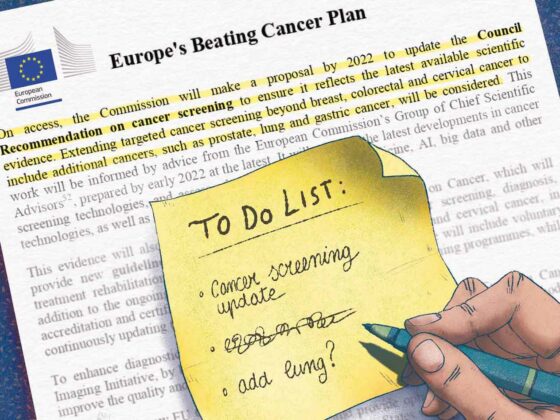Cancer survivors who combine being inactive (or insufficiently active) with sitting for more than eight hours a day dramatically increase their risk of both cancer specific and overall mortality. The prospective cohort study, published in JAMA Oncology (6 January 2022), found the association of prolonged sitting and low levels of physical activity increased the risk of dying from cancer 4.7 fold and of dying from all causes 5.38 fold.
“We found that the mortality risk from the combined effects of being inactive and sitting were greater than you would expect from the summation of each on their own,” says Lin Yang, the corresponding author, from Cancer Care Alberta, Calgary, Canada.
The study, claim the authors, is the first to prospectively investigate the independent and joint associations of sitting time and leisure-time physical activity with mortality outcomes in a nationally representative sample of cancer survivors.
Globally, the number of people surviving cancer is rapidly growing, leading to a pressing need to identify strategies survivors can use to improve long-term health. Physical activity, it has been hypothesised, improves cancer survival through three main pathways: direct effects on tumour growth and metastasis, improved treatment completion, and improved treatment efficacy. However, cancer survivors are known to have low levels of physical activity, with more than one-third participating in little or no leisure-time physical activity, while spending prolonged periods sitting.
Evidence on the effects of sedentary behaviour in cancer survivors has been limited, although previous cohort studies showed high levels of post-diagnosis television watching was associated with an increased risk of all-cause mortality in breast, colon and prostate cancers. In cancer-free populations, high levels of physical activity have been shown to offset the negative effect of sedentary behaviour.
In the current study, Chao Cao, an expert in movement science from the Washington University of Medicine, and colleagues, set out to examine the association of total sitting time and leisure-time physical activity with all-cause, cancer-specific and non-cancer mortality. To do this, the team extracted data on a representative sample of 1,535 cancer survivors from the US National Health and Nutrition Examination survey between 2007 and 2014, weighted to (or representing) 14 million cancer survivors. During initial interviews, participants provided information about any previous cancers and also filled in the Global Physical Activity Questionnaire to assess sitting time and leisure-time physical activity during a typical week. Mortality was tracked until the end of 2015.
Results show that, among 1,535 cancer survivors, 950 (56.8%) reported leisure-time physical activity (LTPA) of 0 minutes per week during the previous week (classed as ‘inactive’), 226 (15/65) reported <150 min/wk (classed as ‘insufficiently active’), and 359 (27.6%) ≥150 min/wk (classed as ‘active’). Furthermore, 553 (35.4%) reported sitting for 6 to 8 hours per day, and 328 (24.9%) reported sitting for >8 hours per day. Notably, 574 (35.8%) of cancer survivors reported no LTPA with concurrent sitting of >6h/day.
During up to nine years of follow-up, there were 293 deaths, consisting of 114 cancer deaths, 41 deaths from heart disease and 138 from other causes. Multivariable models showed:
- Being physically active was associated with lower risks of all-cause mortality (HR=0.34) and cancer-specific mortality (HR=0.32) compared with being inactive,
- Sitting >8 hours/day was associated with higher all-cause mortality (HR=1.81) and cancer-specific mortality (HR=2.27) compared with sitting <4 hours/day,
- Inactive and insufficiently active survivors who sat >8 hours/day had much higher overall mortality (HR=5.38) and cancer-specific mortality (HR=4.71) compared to survivors who sat <4 hours/day plus had LTPA ≥150 min/wk.
“This study has provided new evidence that sedentary behaviour and physical activity should be jointly considered in future observational, epidemiologic and intervention studies,” write the authors. Additionally, the findings show that more than one-third of cancer survivors are not exercising and are sitting for more than six hours a day, and that less than one-third get the recommended >150 minutes of exercise a week.
While the exact biological mechanisms regarding the detrimental effects of sitting are unclear, experimental studies have shown that uninterrupted sitting for a long period is associated with impaired glucose metabolism and increased systematic inflammation. “Other hypotheses include sitting for long periods inducing exercise resistance and diminishing the benefits of physical activity, and increasing risks of cachexia, thromboembolic events, and fatigue, leading to worse cancer survivals,” says Cao.
Most people (even if they don’t follow it) are familiar with the idea of introducing more exercise into their daily routines. But the concept of countering sitting (especially among those with desk jobs) may be more challenging. Strategies people can use to reduce sitting, suggests Yang, include setting an alarm to get up and stretch, taking walking breaks, having standing meetings and performing household chores while watching television.
“The challenge lies in how to personalise these interventions, given the diverse profiles of cancer survivors by their disease factors, socio-demographic characteristics, behaviour patterns, and environmental supports,” says Yang. The ultimate goal, she adds, is to be able to provide specific lifestyle modifications that can be prescribed to all cancer survivors.












